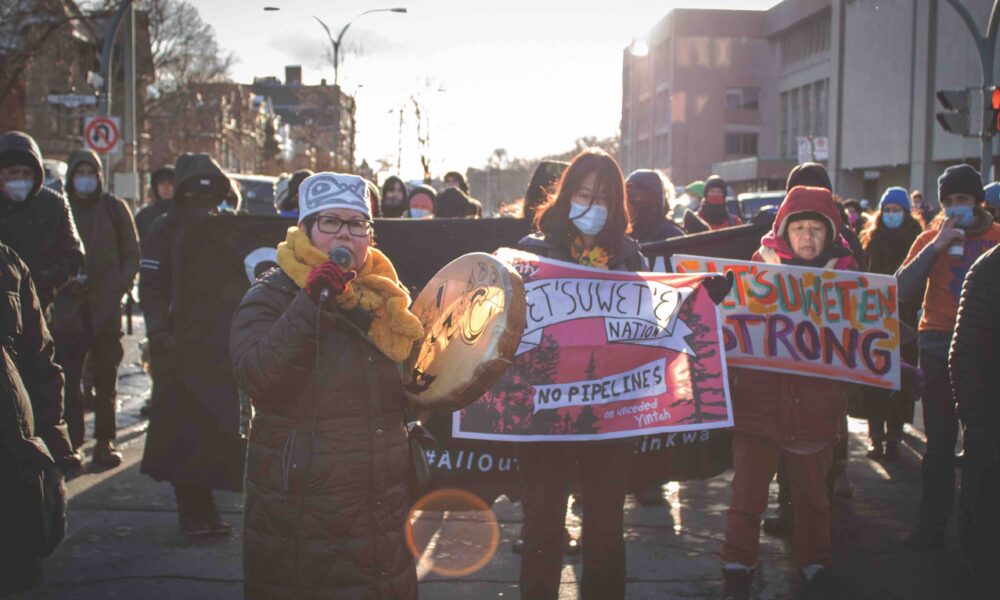The Montreal chapter of the activist group Convergence des luttes anticapitalistes (CLAC) hosted a protest in support of Indigenous sovereignty on Nov. 27, marching in front of and around the Montreal office of the Royal Canadian Mounted Police (RCMP). McGill students and Divest McGill members participated in the demonstration alongside other environmental, Indigenous, and other activist groups.
The primary focus of the protest was a recent escalation of the construction of TransCanada Energy’s Coastal GasLink (CGL) pipeline’s through the unceded territory of the Wet’suwet’en First Nation in British Columbia, which has been ongoing since 2019. The project has garnered much criticism, as it began without the proper consent of Wet’suwet’en, and police have been quick to use force to suppress dissenters, using police dogs, destroying property, and threatening people with rifles. This November, the RCMP invaded resistance camps—like the Coyote Camp—violently arresting activists and journalists.
Marlene Hale, a land defender from the Small Frog Clan of the Wet’suwet’en nation, spoke at the protest and expressed her frustration with the Canadian government’s seizure and occupation of their land. Hale described how government officials avoided going through the proper channels of Wet’suwet’en leadership for their consent, instead seeking approval from the twenty band councils, who all signed on to the project. Hale brought this up to Prime Minister Justin Trudeau at a town hall in Saint-Hyacinthe, Quebec back in 2019.
“[I asked him,] ‘how do you not know that [for] consent in our nation, you’re supposed to go to the hereditary chiefs?’” Hale said. “They know who’s going to sign, who is the weak link, and who they can get [consent from] to do the work they want for as little as they can [….] The consent was not given by the right land title holder, which is the hereditary chief, Woos. Right now, he is on his own territory fighting [the RCMP] to gain access to his own home.”
The RCMP has confronted Wet’suwet’en land defenders several times over the last couple of years in an attempt to quell resistance to the pipeline. From Nov. 19 to Nov. 20, they had arrested 29 people, including two journalists, in British Columbia; protestors were trying to interfere with the pipeline’s construction in order to protect the land. The latest wave of arrests spurred protests across the country, including the one in Montreal this past Saturday. Eve Saint, the daughter of Wet’suwet’en hereditary Chief Woos, described the RCMP’s treatment of the protesters and journalists who were arrested, including Wet’suwet’en land defender Sleydo’.
“I just gotta give a lot of love to Sleydo’ because she is a mother, she is an Indigenous Wet’suwet’en mother, [and] she is raising her babies on the Yintah, on the land,” Saint said. “And now, these courts have […] criminalized her and [are] trying to keep her from moving freely on her own land, on her own territory.”
Saint herself has been on the frontlines of the fight; she was arrested alongside three others at Gidimt’en Checkpoint on Feb. 7, 2020 while defending Wet’suwet’en land. Saint condemned the violence the RCMP has inflicted on her people over the past week.
“We have elders that are being dragged off the Yintah, that are being denied their medication, and that had to go to the hospital,” Saint said. “This is at the hands of the RCMP. This is how they look at Wet’suwet’en people, this is how they look at Wet’suwet’en women, mothers, matriarchs, hereditary chiefs. They point their guns at us when they want us off that land so they can steal it. It is stolen land. They want us dead.”
After Saint finished speaking, the group marched toward downtown Montreal, followed by police officers who maintained a heavy presence throughout the demonstration.
In a subsequent webinar on Nov. 28, Ellen Gabriel, who is part of the Turtle Clan within the Mohawk nation of Kanehsatà:ke, compared the situation to the Oka crisis that occurred in 1990. At the time, the Sûreté du Québec (SQ) provincial police force violently invaded Kanehsatà:ke land that developers wanted to turn into a golf course. Following SQ raids of Mohawk territory, there was a 78-day standoff as the police faced down Mohawk warriors defending their land. Then-Quebec Premier Robert Bourassa eventually brought in the Canadian military to replace the SQ, and the standoff ended whenMohawk warriors had to surrender.
“The fact that the RCMP are being the root squad for Coastal GasLink as the SQ were for the municipality of Oka and the rich developers means that we haven’t gotten very far in the reconciliation process that Trudeau and others keep talking about,” Gabriel said. “This is not reconciliation. [Indigenous peoples] were here long before Europeans arrived, and we are still being treated, 500-plus years later, as if we are disposable, as if our rights don’t matter.”







